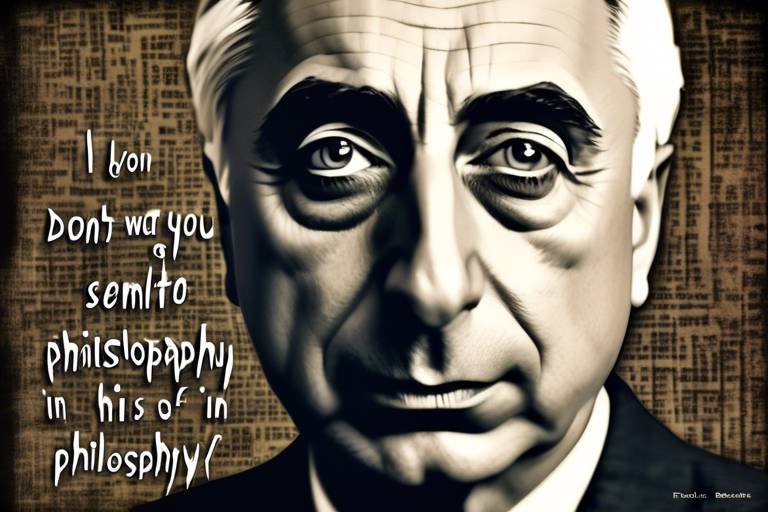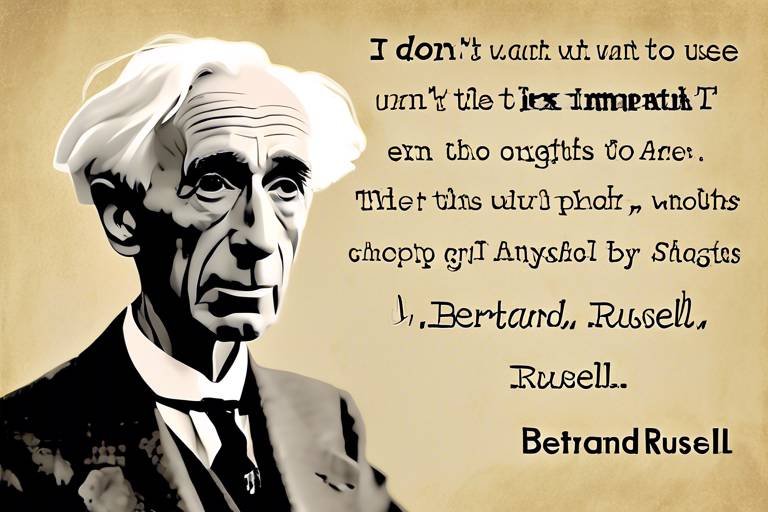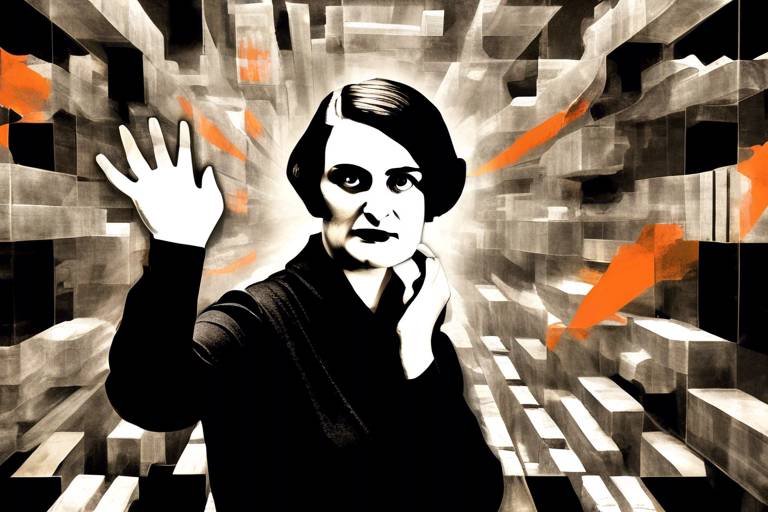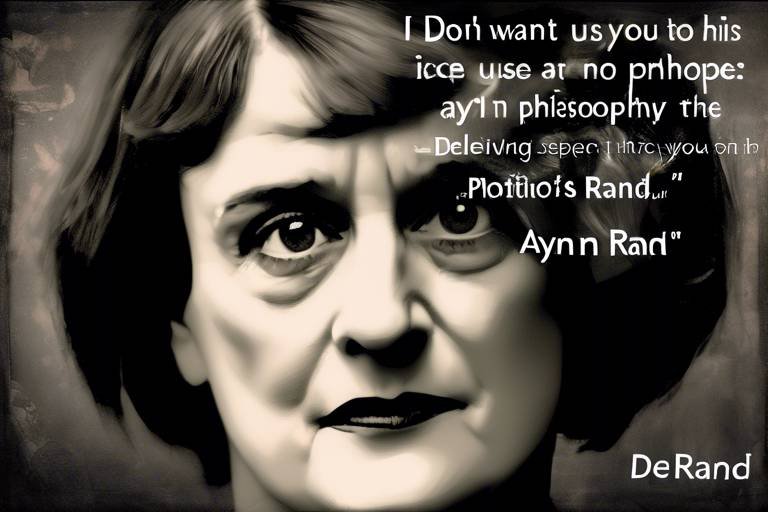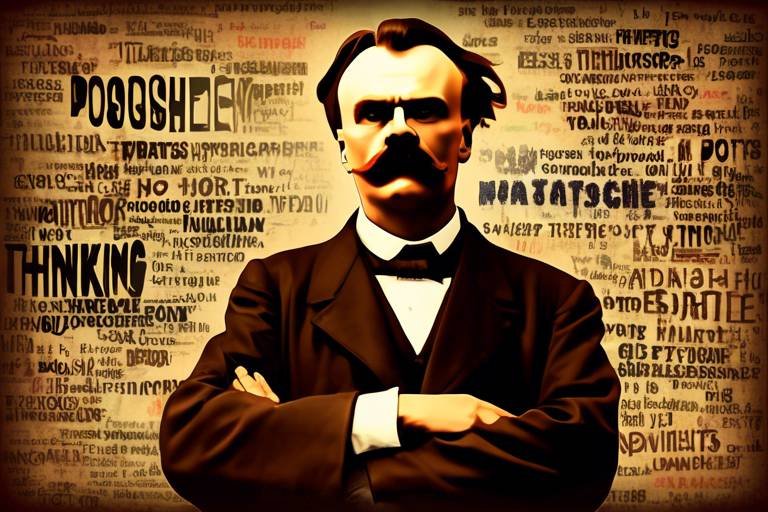A Look into Hobbes's Leviathan and its Political Philosophy
Thomas Hobbes's Leviathan is not just a book; it’s a monumental piece of political philosophy that challenges our understanding of human nature and governance. Written in the mid-17th century, it paints a vivid picture of a world where chaos reigns without a strong authority to maintain order. Hobbes’s work is a compelling exploration of the fundamental questions surrounding the structure of society and the role of government. In this article, we will delve into the foundational concepts of Hobbes's philosophy, examining the implications of his theories on human instinct, governance, and the social contract. By understanding Hobbes’s perspective, we can appreciate the lasting influence of his ideas on contemporary political thought.
In Hobbes's view, the state of nature is a grim landscape where life is “solitary, poor, nasty, brutish, and short.” Imagine a world devoid of laws, where every individual is driven by self-interest and survival instincts. In such a scenario, conflict is not just possible; it’s inevitable. Hobbes suggests that humans are naturally inclined towards competition, distrust, and glory-seeking. This bleak depiction raises a crucial question: how can we escape this chaotic state? The answer lies in the establishment of a governing authority that can impose order and security, transforming our natural instincts into a cooperative society.
At the heart of Hobbes's philosophy is the concept of the social contract. This agreement represents a pivotal moment where individuals collectively consent to surrender certain freedoms in exchange for security and peace. But what does this really mean? Imagine a group of people on a sinking ship. To survive, they must agree to follow a captain's orders, even if it means giving up some personal liberties. This social contract establishes the foundation of political authority. The implications of this agreement are profound, as it raises questions about the nature of authority and individual rights. Are we willing to trade our freedoms for the promise of safety?
Hobbes argues for a powerful sovereign, a figure or assembly that embodies the collective will of the people. This sovereign is not just a ruler but a necessary force to maintain peace and order. Think of the sovereign as the captain of our ship—without decisive leadership, chaos ensues. The characteristics of this authority are critical; it must be strong enough to enforce laws and prevent conflict, yet its legitimacy stems from the consent of the governed. This dynamic relationship between authority and the people is central to Hobbes's political theory.
A key debate arises from Hobbes's advocacy for absolute authority versus modern preferences for limited government. While Hobbes champions a powerful sovereign to maintain order, contemporary political thought often leans towards checks and balances to prevent tyranny. This contrast raises essential questions about the best way to achieve stability and protect individual rights. Is an all-powerful ruler the best solution for societal peace, or does this lead to oppression? The discussion continues to resonate in today’s political landscape.
Fear is a central theme in Hobbes's philosophy, serving as a powerful motivator for individuals to seek governance. In a world where danger lurks at every corner, fear compels people to relinquish some freedoms for the sake of safety. This notion is akin to a child who clings to a parent during a thunderstorm; the fear of the unknown drives them to seek comfort and protection. Understanding how fear influences human behavior is crucial in analyzing political structures and the legitimacy of authority.
The impact of Hobbes's Leviathan on modern political philosophy cannot be overstated. His ideas have shaped the thoughts of later thinkers, influencing the evolution of political ideologies. From the Enlightenment to contemporary discussions on governance, Hobbes's exploration of human nature and authority continues to provoke thought and debate. His work prompts us to reconsider the balance between freedom and security, a dilemma that remains relevant in today’s world.
Despite being penned in the 17th century, Hobbes's ideas resonate strongly in contemporary political discourse. His insights into human nature and the necessity of governance provide a framework for understanding modern conflicts and societal structures. For instance, consider the ongoing debates about government surveillance and personal privacy. Hobbes's perspective encourages us to reflect on the trade-offs between security and individual rights in our increasingly complex world.
Hobbes's assertion that humans are inherently conflictual raises critical questions about our societal structures today. In a world filled with political strife and social unrest, his views compel us to analyze the roots of these conflicts. Are we, as Hobbes suggested, doomed to repeat cycles of violence and discord? By examining current events through a Hobbesian lens, we can gain insights into the motivations behind human behavior and the importance of establishing effective governance.
The balance of power is another critical concept in political theory that Hobbes's ideas inform. In both domestic and international contexts, the dynamics of power can dictate stability and peace. Hobbes's thoughts on a strong sovereign can be seen in contemporary discussions about the roles of states and institutions in maintaining order. Understanding these power dynamics is essential for navigating the complexities of modern governance and international relations.
- What is the main idea of Hobbes's Leviathan? Hobbes's Leviathan argues for a strong, centralized authority to prevent chaos and maintain social order.
- How does Hobbes view human nature? Hobbes believes that humans are naturally self-interested and prone to conflict without governance.
- What is the social contract? The social contract is an agreement where individuals consent to surrender some freedoms for security and order.
- Why is fear important in Hobbes's philosophy? Fear motivates individuals to seek governance and security, leading to the establishment of authority.

Leviathan,
This article explores the foundational concepts of Thomas Hobbes's Leviathan, examining its implications for political theory, human nature, and the social contract, as well as its lasting influence on contemporary thought.
Hobbes presents a bleak view of the state of nature, describing it as a condition of perpetual conflict. This subheading delves into his ideas about human instincts and the necessity of governance.
Central to Hobbes's philosophy is the social contract, where individuals consent to surrender some freedoms for security. This section analyzes the implications of this agreement for authority and individual rights.
Hobbes argues for a powerful sovereign to maintain peace and order. This subheading examines the characteristics and powers of this authority, as well as its role in enforcing the social contract.
A key debate arises between Hobbes's advocacy for absolute authority and modern preferences for limited government. This section contrasts these perspectives and their implications for political theory.
Fear plays a crucial role in Hobbes's philosophy, motivating individuals to seek peace through governance. This subheading explores how fear influences human behavior and political structures.
Hobbes's Leviathan has significantly influenced modern political philosophy. This section discusses its impact on later thinkers and the evolution of political ideologies.
Despite being written in the 17th century, Hobbes's ideas remain relevant. This subheading examines how his concepts apply to contemporary political issues and debates.
Hobbes's view of human nature as inherently conflictual raises questions about societal structures today. This section analyzes current conflicts through the lens of Hobbesian thought.
The balance of power is a critical concept in political theory. This subheading discusses how Hobbes's ideas inform current understandings of power dynamics within states and international relations.
- What is the main idea of Hobbes's Leviathan?
Hobbes's Leviathan presents the idea that in the absence of a strong central authority, human life would be "solitary, poor, nasty, brutish, and short." He argues for the necessity of a social contract to establish governance and maintain order.
- How does Hobbes view human nature?
Hobbes has a rather pessimistic view of human nature, suggesting that individuals are driven by self-interest and are naturally in conflict with one another. This view underpins his argument for a powerful sovereign to impose order.
- What is the significance of the social contract?
The social contract is significant because it represents an agreement among individuals to form a society and accept certain constraints on their freedoms in exchange for security and order.
- How does Leviathan influence modern political thought?
Hobbes's ideas in Leviathan have laid the groundwork for modern political theory, influencing concepts of governance, authority, and individual rights that continue to resonate in contemporary discussions.

examining its implications for political theory, human nature, and the social contract, as well as its lasting influence on contemporary thought.
This article explores the foundational concepts of Thomas Hobbes's Leviathan, examining its implications for political theory, human nature, and the social contract, as well as its lasting influence on contemporary thought.
Hobbes presents a bleak view of the state of nature, describing it as a condition of perpetual conflict. This subheading delves into his ideas about human instincts and the necessity of governance.
Central to Hobbes's philosophy is the social contract, where individuals consent to surrender some freedoms for security. This section analyzes the implications of this agreement for authority and individual rights.
Hobbes argues for a powerful sovereign to maintain peace and order. This subheading examines the characteristics and powers of this authority, as well as its role in enforcing the social contract.
A key debate arises between Hobbes's advocacy for absolute authority and modern preferences for limited government. This section contrasts these perspectives and their implications for political theory.
Fear plays a crucial role in Hobbes's philosophy, motivating individuals to seek peace through governance. This subheading explores how fear influences human behavior and political structures.
Hobbes's Leviathan has significantly influenced modern political philosophy. This section discusses its impact on later thinkers and the evolution of political ideologies.
Despite being written in the 17th century, Hobbes's ideas remain relevant. This subheading examines how his concepts apply to contemporary political issues and debates.
Hobbes's view of human nature as inherently conflictual raises questions about societal structures today. This section analyzes current conflicts through the lens of Hobbesian thought.
The balance of power is a critical concept in political theory. This subheading discusses how Hobbes's ideas inform current understandings of power dynamics within states and international relations.
Hobbes's Leviathan is not just a historical text; it serves as a critical lens through which we can examine the complexities of political theory and human nature. At its core, Hobbes presents a rather grim view of humanity, positing that without the constraints of a strong governing body, individuals would act solely out of self-interest, leading to a state of chaos. This perspective challenges us to consider the fundamental motivations behind human actions and the necessity of governance.
In terms of political theory, Hobbes's ideas about the social contract have laid the groundwork for many modern democratic principles. He argues that individuals willingly surrender some of their freedoms in exchange for the protection and order provided by a sovereign authority. This concept raises important questions about the nature of authority and the extent of individual rights. Are we, as citizens, willing to relinquish certain freedoms for the sake of security? How much power should we entrust to our leaders? These questions resonate deeply in today's political landscape.
Furthermore, Hobbes's emphasis on fear as a motivating factor in human behavior is particularly relevant in contemporary discussions about governance. Fear of violence, instability, and chaos often drives individuals to seek out strong leadership. This notion can be observed in various political systems around the world, where leaders exploit public fears to consolidate power.
To illustrate the enduring relevance of Hobbes's ideas, consider the following table that highlights key implications of his work:
| Aspect | Hobbes's View | Contemporary Relevance |
|---|---|---|
| Human Nature | Inherently self-interested and conflictual | Ongoing global conflicts and power struggles |
| Social Contract | Individuals surrender freedoms for security | Debates over government surveillance and civil liberties |
| Sovereign Authority | Need for a powerful governing body | Discussions on the role of government in crisis management |
In conclusion, Hobbes's Leviathan offers profound insights into the human condition and the necessity of governance. By examining his implications for political theory, human nature, and the social contract, we can better understand the complexities of our modern political landscape.
- What is the main argument of Hobbes's Leviathan? Hobbes argues that in the absence of a strong central authority, human beings would exist in a state of constant conflict, necessitating a social contract to ensure peace and order.
- How does Hobbes view human nature? Hobbes views human nature as inherently self-interested and conflictual, which drives individuals to seek governance for security.
- What is the relevance of Hobbes's ideas today? Hobbes's ideas about the social contract and the role of fear in governance continue to inform contemporary political debates and the nature of authority.

The State of Nature
When we dive into the mind of Thomas Hobbes, we are greeted with a rather grim portrayal of what he termed the state of nature. Imagine a world devoid of any governing authority, where every individual is left to fend for themselves. In such a scenario, Hobbes argues, life would be a relentless struggle for survival, characterized by chaos and conflict. To him, human beings are driven by their primal instincts—self-preservation, fear, and the desire for power. Without a higher authority to impose order, society would descend into what he famously described as a state where life is "solitary, poor, nasty, brutish, and short."
In essence, Hobbes paints a picture where the absence of governance leads to a war of all against all. Picture a jungle where every creature is out for itself; this is how Hobbes envisioned human existence without the structure of society. He believed that humans, in their natural state, are inherently competitive and aggressive, driven by their desires and fears. This view starkly contrasts with the more optimistic perspectives of human nature put forth by other philosophers, who argue that humans are inherently good or cooperative.
Furthermore, Hobbes posits that the constant threat of violence and insecurity in the state of nature compels individuals to seek peace and stability. It's almost as if he suggests that fear is the great equalizer—a force that drives us to form societies and establish rules. In his view, the chaotic nature of human instincts necessitates a powerful governing body to maintain order and protect individuals from one another. This leads us to the crux of his political philosophy: the need for a social contract that binds individuals to a common authority for mutual protection.
In Hobbes's world, the state of nature is not just a theoretical concept; it serves as a foundation for understanding why governance is essential. The implications of his ideas resonate through history, prompting us to consider how we structure our societies today. As we reflect on the state of nature, we might ask ourselves: What would our world look like without laws and governance? The thought alone can be unsettling.
To further illustrate Hobbes's perspective, let's break down some key aspects of his view on the state of nature:
| Aspect | Description |
|---|---|
| Human Nature | Inherently self-interested and competitive, leading to conflict. |
| Conflict | Life without authority results in a constant state of war. |
| Fear | The primary motivator for individuals to seek peace and governance. |
| Need for Authority | A strong sovereign is essential to maintain order and protect individuals. |
In summary, Hobbes's view of the state of nature serves as a stark reminder of the chaos that can ensue in the absence of governance. It challenges us to appreciate the structures we have in place and to recognize the delicate balance between freedom and security. So, the next time you ponder the nature of society, consider Hobbes's insights and the unsettling vision of a world without order.

The Social Contract
At the heart of Hobbes's political philosophy lies the concept of the social contract, a revolutionary idea that reshaped the way we think about governance and individual rights. Imagine a world where every person is in a constant battle for survival, where the only law is the law of the jungle. This is the world Hobbes envisioned in his book, Leviathan. To escape this chaos, individuals come together, agreeing to form a society where they relinquish some of their freedoms in exchange for security and order. But what does this really mean for us?
The social contract is not merely a historical concept; it’s a living idea that influences our political landscape today. Hobbes argues that in order to escape the state of nature—characterized by fear, violence, and uncertainty—individuals must consent to a common authority. This authority, often embodied in a sovereign, holds the power to enforce laws and maintain peace. But here’s the kicker: this surrender of freedom is not done lightly. It’s a calculated decision made out of necessity. People recognize that the chaos of unregulated existence is far worse than the limitations imposed by a governing body.
Now, let’s dig deeper into what this social contract entails. Hobbes believed that individuals are inherently self-interested, driven by their desires and fears. Therefore, the social contract is a rational agreement where people collectively agree to prioritize their safety and well-being over absolute freedom. This leads to the establishment of a governing authority that wields significant power, as it is entrusted with the responsibility of maintaining order. But how much power is too much? This question has sparked endless debates among political theorists.
Essentially, the social contract can be broken down into a few key components:
- Consent: Individuals agree to form a society and accept the rules that come with it.
- Security: In exchange for their freedom, individuals gain protection from violence and chaos.
- Authority: A sovereign is established to enforce laws and maintain order, possessing the power to act decisively.
However, the implications of this agreement are profound. It raises questions about the nature of authority and individual rights. How much power should the sovereign have? Can individuals reclaim their freedoms if the sovereign becomes tyrannical? These dilemmas highlight the tension between authority and liberty, a theme that resonates throughout political discourse even today. Hobbes’s ideas challenge us to consider the balance between safety and freedom, a conversation that is as relevant now as it was in the 17th century.
Moreover, the social contract implies that the legitimacy of a government hinges on its ability to provide security and uphold the social order. If it fails to do so, citizens may feel justified in rebelling against it. This notion of legitimacy is crucial; it suggests that the power of the sovereign is not absolute but contingent upon the consent of the governed. Isn’t it fascinating how a concept from hundreds of years ago continues to shape our understanding of government and authority?
In conclusion, Hobbes's social contract serves as a foundational pillar in the study of political philosophy. It challenges us to think critically about the nature of governance, the rights of individuals, and the responsibilities of authority. As we navigate through modern political landscapes, the essence of Hobbes's ideas remains ever-present, inviting us to reflect on the delicate balance between freedom and security in our own lives.
- What is the social contract? The social contract is an agreement among individuals to form a society and establish a governing authority in exchange for security and order.
- Why did Hobbes believe in a strong sovereign? Hobbes believed that a strong sovereign was necessary to maintain peace and prevent the chaos of the state of nature.
- How does the social contract relate to individual rights? The social contract involves individuals surrendering some freedoms, but it also establishes the basis for their rights within a governed society.
- Is the social contract still relevant today? Yes, the social contract remains relevant as it informs contemporary discussions about authority, governance, and individual freedoms.

The Sovereign Authority
In Leviathan, Thomas Hobbes makes a compelling case for the establishment of a powerful sovereign authority as a necessary foundation for peace and order in society. He argues that in the absence of a central authority, human beings are left to their own devices, which inevitably leads to chaos and conflict. Imagine a world where everyone acts solely on their instincts and desires; it would be akin to a wild jungle where the strongest survive, and the weak are left to fend for themselves. This bleak outlook underscores the importance Hobbes places on a sovereign authority that can impose rules and maintain order.
According to Hobbes, the sovereign must possess absolute power, which he defines as the authority to create laws, enforce them, and ensure compliance among the populace. This sovereign could be a monarch, an assembly, or any entity that holds the collective agreement of the people. The crux of Hobbes's argument is that individuals consent to this arrangement through the social contract, where they agree to relinquish certain freedoms in exchange for security and stability. In this way, the sovereign becomes a necessary evil—powerful enough to keep the peace but also a potential threat to individual liberties.
To better understand the characteristics of this sovereign authority, we can break down its essential attributes:
- Centralized Power: The sovereign must hold ultimate authority to make decisions and enforce laws.
- Legitimacy: The power of the sovereign derives from the consent of the governed, making it legitimate in the eyes of the people.
- Enforcement: The sovereign must have the means to enforce laws, whether through military power, police forces, or other means of coercion.
- Stability: The ultimate goal of the sovereign is to ensure peace and order within society.
Hobbes's vision of sovereign authority raises critical questions about the nature of power and governance. While he advocates for a strong, centralized authority, he also acknowledges the potential for abuse of power. This duality is what makes the discussion around sovereign authority so rich and complex. The balance between maintaining order and protecting individual rights is a fine line that modern political theorists continue to grapple with.
Moreover, Hobbes's ideas about the sovereign authority have paved the way for ongoing debates about governance structures. For example, in contemporary discussions, we often hear about the tension between state control and personal freedoms. As societies evolve, the characteristics of the sovereign may change, but the fundamental question remains: how much power should be vested in a single authority to ensure the safety and well-being of its citizens without infringing on their liberties?
As we reflect on Hobbes's arguments, it becomes clear that the concept of sovereign authority is not just a relic of the past but a relevant topic in today's political landscape. The challenge lies in finding a system of governance that balances authority with the rights of individuals, a challenge that continues to resonate in modern political discourse.
- What is the main idea behind Hobbes's concept of sovereign authority?
Hobbes argues that a powerful sovereign is essential to maintain peace and order in society, as it prevents the chaos that arises in the absence of centralized power. - How does the social contract relate to sovereign authority?
The social contract is an agreement where individuals give up certain freedoms in exchange for security provided by the sovereign authority. - What are the potential risks of a powerful sovereign?
A powerful sovereign can lead to the abuse of power, where individual rights may be compromised for the sake of order. - How do Hobbes's ideas apply to modern governance?
Hobbes's ideas continue to influence discussions about the balance between state control and individual freedoms in contemporary political systems.

When we dive into the political philosophy of Thomas Hobbes, one of the most striking debates that emerges is the tension between absolutism and limited government. Hobbes, writing in the tumultuous 17th century, argued fervently for a powerful sovereign who could maintain order and prevent the chaos he believed was inherent in human nature. His vision of a strong, centralized authority was born from a deep-seated fear of anarchy—a fear that, if left unchecked, human beings would revert to a state of constant conflict, much like a jungle where the strongest rule without regard for the weak. In this chaotic state, life, according to Hobbes, would be "solitary, poor, nasty, brutish, and short."
On the flip side, the modern political landscape often champions the idea of limited government, where the powers of the state are curtailed to protect individual freedoms and rights. This perspective argues that too much power concentrated in one entity can lead to tyranny, oppression, and the very chaos Hobbes sought to avoid. The debate can be likened to a pendulum swinging between two extremes: on one end, the absolute power of the sovereign, and on the other, the empowering of the individual against state overreach.
To better understand these contrasting views, let’s break down some key differences in a table format:
| Aspect | Absolutism | Limited Government |
|---|---|---|
| Power Structure | Concentration of power in a single sovereign | Distribution of power among various branches |
| Individual Rights | Subordinate to the authority of the sovereign | Protected against government infringement |
| Role of Government | Enforcer of order and peace | Protector of liberties and rights |
| Public Consent | Implicit; subjects must obey | Explicit; governed by the consent of the governed |
The implications of Hobbes's absolutism are profound. He believed that in order to escape the horrors of the state of nature, individuals must consent to give up some of their freedoms to a sovereign power. This idea forms the crux of the social contract, where the safety and security provided by a strong ruler are seen as worth the trade-off of personal liberties. However, this raises a critical question: how much power is too much? The fear of tyranny looms large, prompting modern thinkers to advocate for checks and balances that prevent any one entity from becoming too powerful.
In contrast, proponents of limited government argue that the essence of political authority should be to serve the people, not to dominate them. They contend that a government’s legitimacy stems from its ability to protect the rights of its citizens rather than impose absolute control over their lives. This perspective aligns with democratic principles, emphasizing the importance of individual agency and the necessity of accountability in governance.
Ultimately, the debate between absolutism and limited government is not just an academic exercise; it resonates deeply in today's political climate. As we witness various forms of governance around the world, the balance between authority and freedom remains a crucial issue. Are we willing to sacrifice some of our freedoms for the sake of security, or do we believe that true safety lies in the empowerment of the individual? This ongoing discussion continues to shape political ideologies and informs our understanding of power dynamics in society.

The Role of Fear
Fear is not just an emotion; it’s a powerful motivator that shapes our decisions and actions. In the context of Hobbes's philosophy, fear is the driving force behind the establishment of political order. Hobbes believed that in the absence of a governing authority, individuals would be in a constant state of fear—fear of violence, fear of theft, and fear of death. This bleak perspective on human nature leads us to a critical question: if humans are inherently self-interested and prone to conflict, how can society function without a strong, unifying force?
Hobbes’s depiction of the state of nature is akin to a chaotic battlefield where every person is at war with every other person. He famously stated that life in such a state would be “solitary, poor, nasty, brutish, and short.” In this scenario, fear of others becomes a compelling reason for individuals to seek peace through governance. This brings us to the social contract—a mutual agreement among individuals to surrender certain freedoms in exchange for security and order. By agreeing to this contract, individuals hope to mitigate their fears and create a more stable society.
Furthermore, Hobbes posits that the sovereign authority, established through the social contract, must wield significant power to maintain peace. This authority serves as a deterrent against the natural human tendency to act out of fear. For instance, if individuals know that there are severe consequences for violent behavior, they are less likely to engage in such actions. In this way, fear transitions from being a source of chaos to a tool for maintaining order. It’s a fascinating paradox: fear, which can drive people apart, can also bring them together under a common authority.
However, the role of fear in governance raises important ethical questions. While fear can be an effective tool for maintaining order, it can also lead to oppression and abuse of power. When fear is used as a means of control, it can transform a sovereign authority into a tyrant. This duality presents a dilemma for modern political systems: how do we balance the need for security with the preservation of individual freedoms? The challenge lies in ensuring that fear does not become the primary mechanism of governance.
In conclusion, fear is a central theme in Hobbes's political philosophy. It illustrates the complex relationship between human nature, governance, and social order. Understanding this role of fear not only provides insight into Hobbes's work but also helps us navigate contemporary political landscapes where the balance of power and individual rights remain hotly debated topics.
- What is the main idea of Hobbes's Leviathan?
Hobbes's Leviathan argues that in the absence of a strong central authority, human life would be chaotic and violent, leading to the necessity of a social contract to ensure peace and security. - How does fear influence human behavior according to Hobbes?
Fear drives individuals to seek governance and security, leading them to surrender some freedoms in exchange for protection from the chaos of the state of nature. - What are the implications of Hobbes's views on modern governance?
Hobbes's ideas raise important questions about the balance between authority and individual rights, particularly regarding the use of fear as a tool for maintaining order.

Thomas Hobbes's Leviathan is not just a historical artifact; it's a cornerstone that has shaped the very foundation of modern political thought. Written in the tumultuous backdrop of the English Civil War, Hobbes's ideas resonate with the chaos and disorder of his time, presenting a compelling argument for the necessity of a strong, centralized authority. His work has influenced countless political theorists and continues to be a reference point in discussions about governance, authority, and human nature.
One of the most significant impacts of Leviathan is its introduction of the concept of the social contract, which posits that individuals consent, either explicitly or implicitly, to surrender some of their freedoms to a sovereign authority in exchange for protection and order. This idea has been pivotal in the development of modern democratic theories. Think about it: without Hobbes, we might not have had the likes of John Locke or Jean-Jacques Rousseau, who expanded upon the social contract theory, albeit in different directions. Hobbes laid the groundwork, and subsequent philosophers built upon it, creating a rich tapestry of political philosophy that continues to evolve.
Moreover, Hobbes's stark view of human nature as inherently self-interested and conflictual has sparked debates that are still relevant today. His assertion that life in the state of nature would be "solitary, poor, nasty, brutish, and short" challenges the optimistic views of human nature held by some modern theorists. This perspective influences contemporary discussions about governance and societal structures, particularly in the context of political stability and conflict resolution.
To further illustrate the lasting impact of Hobbes's ideas, consider the following table that highlights key political thinkers influenced by Leviathan:
| Thinker | Key Contributions | Relation to Hobbes |
|---|---|---|
| John Locke | Natural rights and government by consent | Countered Hobbes's absolute authority with limited government |
| Jean-Jacques Rousseau | General will and direct democracy | Challenged Hobbes's view of human nature and governance |
| Max Weber | Types of authority and legitimacy | Built on Hobbes's ideas of state power and authority |
Hobbes's influence is also evident in contemporary political discourse, particularly regarding the balance of power and the role of fear in governance. His assertion that fear is a primary motivator for individuals to seek peace through governance has led to discussions about how fear can be both a tool for political control and a catalyst for societal change. In many ways, Hobbes's insights foreshadow modern debates about security, surveillance, and individual freedoms.
In conclusion, the impact of Leviathan on modern political thought is profound and multifaceted. Hobbes's exploration of human nature, authority, and the social contract has laid the groundwork for ongoing discussions in political philosophy. His ideas challenge us to consider the delicate balance between freedom and security, a debate that remains as urgent today as it was in the 17th century.
- What is the main idea of Hobbes's Leviathan?
Hobbes's main idea revolves around the necessity of a powerful sovereign authority to prevent chaos and maintain order in society through a social contract.
- How does Hobbes view human nature?
Hobbes views human nature as inherently self-interested and conflictual, which necessitates a strong governing power to ensure peace.
- What is the social contract theory?
The social contract theory posits that individuals consent to surrender some of their freedoms to a governing authority in exchange for protection and order.

Leviathan
This article explores the foundational concepts of Thomas Hobbes's , examining its implications for political theory, human nature, and the social contract, as well as its lasting influence on contemporary thought.
Hobbes presents a bleak view of the state of nature, describing it as a condition of perpetual conflict. This subheading delves into his ideas about human instincts and the necessity of governance.
Central to Hobbes's philosophy is the social contract, where individuals consent to surrender some freedoms for security. This section analyzes the implications of this agreement for authority and individual rights.
Hobbes argues for a powerful sovereign to maintain peace and order. This subheading examines the characteristics and powers of this authority, as well as its role in enforcing the social contract.
A key debate arises between Hobbes's advocacy for absolute authority and modern preferences for limited government. This section contrasts these perspectives and their implications for political theory.
Fear plays a crucial role in Hobbes's philosophy, motivating individuals to seek peace through governance. This subheading explores how fear influences human behavior and political structures.
Hobbes's has significantly influenced modern political philosophy. This section discusses its impact on later thinkers and the evolution of political ideologies.
Despite being written in the 17th century, Hobbes's ideas remain relevant. This subheading examines how his concepts apply to contemporary political issues and debates.
Hobbes's view of human nature as inherently conflictual raises questions about societal structures today. This section analyzes current conflicts through the lens of Hobbesian thought.
The balance of power is a critical concept in political theory. This subheading discusses how Hobbes's ideas inform current understandings of power dynamics within states and international relations.
In , Hobbes articulates a vision of a powerful, centralized authority as the only solution to the chaos of human existence. He famously likens this authority to a great monster, a Leviathan, that embodies the collective will of the people. This metaphor serves to illustrate the necessity of a strong government to avoid the anarchy of the state of nature, where life is described as "solitary, poor, nasty, brutish, and short." Hobbes argues that without a common power to keep them in awe, individuals would act on their basic instincts, leading to a constant state of war. The creation of the Leviathan is thus a rational response to human nature, which he sees as driven by self-interest and fear.
Hobbes's vision is not merely about control; it is about the preservation of life itself. He asserts that individuals must give up certain freedoms—what he calls the "rights of nature"—to the sovereign in exchange for peace and security. This social contract is foundational to his political philosophy, emphasizing that the legitimacy of the sovereign derives from the consent of the governed. However, this raises important questions about the limits of authority and the rights of individuals under such a regime. Hobbes's insistence on a powerful sovereign challenges contemporary notions of democracy and civil liberties, making his work a critical point of reference in political discourse.
To further illustrate Hobbes's ideas, consider the following table that summarizes key aspects of his political philosophy:
| Concept | Description |
|---|---|
| State of Nature | A condition of perpetual conflict where life is chaotic and dangerous. |
| Social Contract | An agreement among individuals to surrender certain freedoms for collective security. |
| Sovereign Authority | A powerful entity that enforces laws and maintains order. |
| Fear | A driving force that compels individuals to seek governance and peace. |
- What is the main idea of Hobbes's Leviathan?
The main idea is that a strong, centralized authority is necessary to prevent chaos and maintain peace in society.
- How does Hobbes view human nature?
Hobbes views human nature as inherently self-interested and conflictual, requiring governance to ensure social order.
- What is the social contract according to Hobbes?
The social contract is an agreement where individuals give up some freedoms to a sovereign in exchange for security and peace.
- Why is fear important in Hobbes's philosophy?
Fear motivates individuals to seek peace through governance, as it helps to prevent the return to the chaotic state of nature.

has significantly influenced modern political philosophy. This section discusses its impact on later thinkers and the evolution of political ideologies.
This article explores the foundational concepts of Thomas Hobbes's Leviathan, examining its implications for political theory, human nature, and the social contract, as well as its lasting influence on contemporary thought.
Hobbes presents a bleak view of the state of nature, describing it as a condition of perpetual conflict. This subheading delves into his ideas about human instincts and the necessity of governance.
Central to Hobbes's philosophy is the social contract, where individuals consent to surrender some freedoms for security. This section analyzes the implications of this agreement for authority and individual rights.
Hobbes argues for a powerful sovereign to maintain peace and order. This subheading examines the characteristics and powers of this authority, as well as its role in enforcing the social contract.
A key debate arises between Hobbes's advocacy for absolute authority and modern preferences for limited government. This section contrasts these perspectives and their implications for political theory.
Fear plays a crucial role in Hobbes's philosophy, motivating individuals to seek peace through governance. This subheading explores how fear influences human behavior and political structures.
Hobbes's Leviathan has significantly influenced modern political philosophy. His ideas set the groundwork for later thinkers, shaping the evolution of political ideologies in profound ways. For instance, Hobbes's portrayal of the social contract has been a cornerstone for various political theories, from liberalism to authoritarianism. Thinkers like John Locke and Jean-Jacques Rousseau built upon, yet diverged from, Hobbes's ideas, emphasizing different aspects of human nature and governance.
Locke, for instance, took Hobbes's social contract theory and infused it with a more optimistic view of human nature. He argued that people are capable of self-governance and that the government's primary role is to protect individual rights. In contrast, Rousseau highlighted the importance of collective will and the concept of the general will, which stands in stark opposition to Hobbes's belief in a singular, absolute sovereign. This divergence has led to a rich tapestry of political thought, where Hobbes's influence is still palpable.
Moreover, Hobbes's ideas have sparked numerous debates regarding the nature of authority and the legitimacy of government power. His assertion that a strong, centralized authority is essential for preventing chaos has resonated through the ages, influencing both totalitarian regimes and democratic principles. The tension between individual freedoms and state control continues to be a pivotal discussion in political philosophy, often tracing back to Hobbes's original assertions.
To illustrate the impact of Leviathan, consider the following table that summarizes the key thinkers influenced by Hobbes and their main contributions:
| Thinker | Contribution | Relation to Hobbes |
|---|---|---|
| John Locke | Emphasis on natural rights and government by consent | Countered Hobbes's view on human nature and authority |
| Jean-Jacques Rousseau | The concept of the general will and collective governance | Opposed Hobbes's idea of absolute sovereignty |
| Karl Marx | Critique of capitalism and class struggle | Informed by Hobbes's views on power dynamics |
| Thomas Jefferson | Incorporation of social contract ideas in the Declaration of Independence | Inspired by the need for government to protect rights |
In essence, Hobbes's Leviathan is not just a historical document; it is a living text that continues to provoke thought and debate in the realm of political philosophy. The echoes of his ideas resonate through the corridors of modern governance, reminding us that the struggle between order and freedom is as relevant today as it was in the 17th century.
Despite being written in the 17th century, Hobbes's ideas remain relevant. This subheading examines how his concepts apply to contemporary political issues and debates.
Hobbes's view of human nature as inherently conflictual raises questions about societal structures today. This section analyzes current conflicts through the lens of Hobbesian thought.
The balance of power is a critical concept in political theory. This subheading discusses how Hobbes's ideas inform current understandings of power dynamics within states and international relations.
- What is the main idea of Hobbes's Leviathan? Hobbes's Leviathan argues for the necessity of a strong central authority to prevent chaos in society.
- How did Hobbes influence modern political thought? His ideas laid the groundwork for the social contract theory, influencing later thinkers like Locke and Rousseau.
- What is the significance of the social contract in Hobbes's philosophy? The social contract represents an agreement among individuals to surrender certain freedoms for the sake of security and order.
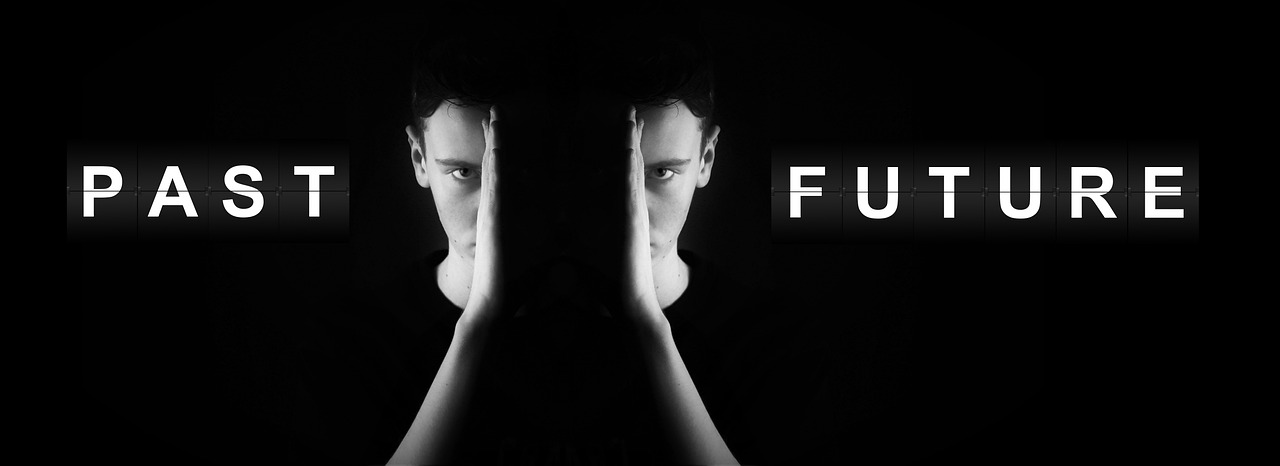
Even though Thomas Hobbes penned his seminal work, Leviathan, in the 17th century, his ideas resonate profoundly in today's political landscape. You might wonder, how can the thoughts of a philosopher from so long ago still hold water in our fast-paced, modern world? The answer lies in the fundamental questions Hobbes raised about human nature, governance, and the social contract—questions that remain relevant as we navigate contemporary issues.
At the heart of Hobbes's philosophy is the idea that humans are driven by self-interest and fear, leading to a natural state of conflict. This perspective offers a lens through which we can examine current global tensions. For instance, take a look at international relations today. Nations often act out of fear of losing power or security, mirroring Hobbes's assertion that without a strong authority to maintain order, chaos ensues. The ongoing conflicts in various regions can be analyzed through this Hobbesian lens, suggesting that the absence of a unifying authority or governance leads to instability.
Moreover, Hobbes's concept of the social contract—the agreement among individuals to form a society for mutual benefit—continues to be a cornerstone of political theory. In contemporary democracies, we see this contract in action through the establishment of laws and regulations that govern behavior. Citizens often consent to surrender certain freedoms in exchange for security and order. However, the balance of this contract can be precarious. As we witness debates over civil liberties versus national security, Hobbes's insights remind us of the delicate dance between individual rights and collective safety.
In light of modern governance, Hobbes's arguments for a powerful sovereign authority raise critical discussions. While many advocate for limited government, the effectiveness of such structures often comes into question, especially in times of crisis. Can a government that is too limited effectively protect its citizens? Or does it risk descending into the very chaos Hobbes warned against? These questions are not just theoretical; they have real implications for policy-making and the structure of our governments today.
Additionally, the role of fear in Hobbes's philosophy cannot be overlooked. Fear is a powerful motivator that shapes human behavior and drives political decisions. In today's context, fear of terrorism, economic instability, and social unrest influences public opinion and policy. Leaders often capitalize on this fear to justify decisions that may infringe upon personal freedoms. Understanding this dynamic through a Hobbesian framework allows us to critically assess the motivations behind political actions and the societal responses they elicit.
To sum it up, Hobbes's Leviathan serves as more than just a historical text; it is a lens through which we can examine and understand the complexities of modern political life. His insights into human nature, the necessity of governance, and the social contract remain vital as we navigate the challenges of our time. The relevance of Hobbes today lies not only in the echoes of his theories in current events but also in the ongoing debates about the nature of power, authority, and the human condition.
- How does Hobbes's view of human nature apply today? Hobbes believed that humans are inherently self-interested and driven by fear, a perspective that helps explain current conflicts and power struggles.
- What is the social contract in modern governance? The social contract is the agreement among individuals to form a society, balancing individual freedoms with the need for security and order.
- Are Hobbes's ideas still relevant in contemporary politics? Yes, Hobbes's insights into governance, authority, and human behavior provide a valuable framework for understanding modern political issues.

When we dive into the depths of Hobbes's political philosophy, one of the most startling revelations is his perspective on the nature of human conflict. Hobbes famously posited that in the absence of a governing authority, life in the state of nature would be "solitary, poor, nasty, brutish, and short." This stark description isn't just a dramatic flourish; it reflects Hobbes's belief that humans are fundamentally driven by self-preservation and competition. Imagine a world where every individual is vying for their own survival, where trust is scarce and every interaction is tinged with suspicion. This paints a chaotic picture, doesn't it?
At the core of Hobbes's argument is the idea that humans are naturally inclined towards conflict due to their desires and fears. He believed that our instincts push us to pursue what we want while simultaneously guarding against threats. This duality creates a perpetual cycle of tension and strife. To illustrate, consider the following factors that contribute to human conflict:
- Competition: Individuals compete for limited resources, whether they be food, land, or power.
- Distrust: In a state of nature, the absence of a common authority breeds suspicion, leading individuals to act defensively.
- Desire for Glory: The pursuit of reputation can lead individuals to engage in conflict to assert their dominance.
Hobbes’s view suggests that without a strong central authority to mediate these conflicts, society would descend into chaos. This is where the concept of the social contract becomes crucial. Individuals, recognizing the futility of their constant struggles, agree to relinquish some of their freedoms in exchange for security and order. This trade-off is essential for the establishment of a peaceful society. However, it raises an important question: to what extent should individuals surrender their freedoms to ensure safety?
Moreover, Hobbes's perspective on human conflict resonates with contemporary issues. Take, for example, the ongoing struggles for resources in various regions of the world. From territorial disputes to economic inequalities, the echoes of Hobbesian thought are evident. As we navigate modern conflicts, it’s vital to consider how fear and competition still shape our interactions. Are we, in essence, still living in a Hobbesian state of nature, albeit with a veneer of civilization?
In conclusion, understanding the nature of human conflict through Hobbes's lens allows us to grasp the complexities of our social structures today. His insights compel us to reflect on our instincts and the societal frameworks we create to manage our inherent tendencies towards conflict. As we continue to engage with these ideas, we must ask ourselves: how can we foster a society that mitigates conflict while preserving individual freedoms?
- What is the state of nature according to Hobbes? Hobbes describes the state of nature as a condition where there is no government or authority, leading to a life filled with conflict and insecurity.
- How does Hobbes define human nature? Hobbes views human nature as inherently self-interested and competitive, driven by basic instincts for survival and dominance.
- What is the social contract? The social contract is an agreement among individuals to surrender certain freedoms in exchange for security and order provided by a governing authority.
- Why is a strong sovereign necessary? Hobbes argues that a strong sovereign is essential to maintain peace and prevent the chaos that arises from human conflict.
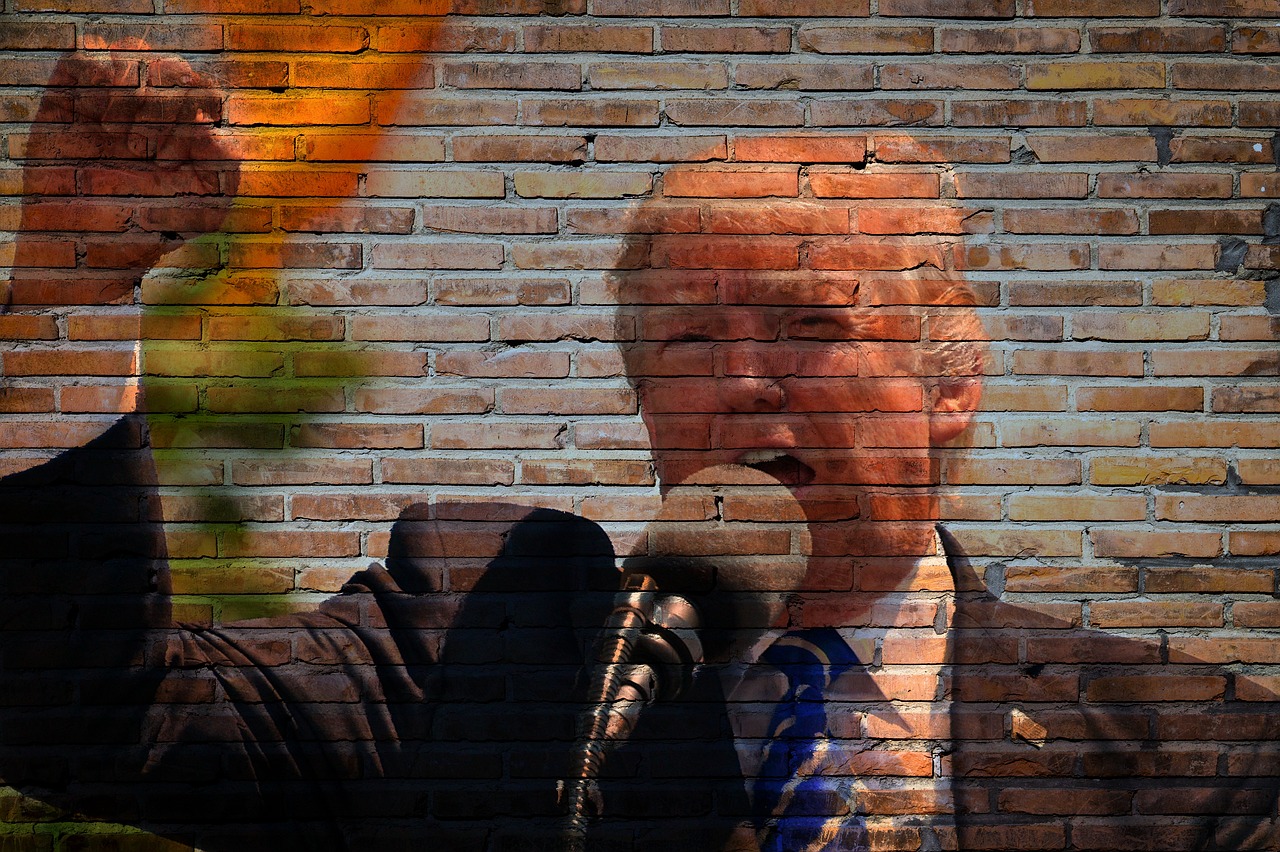
The concept of balance of power is a cornerstone in political theory, and it plays a pivotal role in understanding both national and international relations. Hobbes's ideas provide a fascinating lens through which we can examine how power dynamics operate within societies. At its core, the balance of power is about ensuring that no single entity becomes too dominant, which can lead to tyranny and oppression. Think of it as a seesaw; if one side becomes too heavy, the entire structure tips, creating instability.
In Hobbes's view, the sovereign authority is essential to maintaining this balance. Without a strong central power, individuals would be left to their own devices, leading to chaos and conflict, much like a group of children left unsupervised in a candy store. The sovereign acts as the referee, ensuring that no individual or group can overpower others. This is crucial not only for internal stability but also for external relations. When states operate in a world without a higher authority, they must navigate a precarious landscape where alliances shift and power dynamics constantly evolve.
Moreover, the balance of power is not just a theoretical framework; it manifests in practical ways in today's political landscape. For instance, nations often engage in strategic alliances to counterbalance larger, more powerful adversaries. This can be seen in historical contexts, such as during the Cold War, where the United States and the Soviet Union engaged in a delicate dance of power, each seeking to prevent the other from gaining too much influence. The balance of power theory suggests that such alliances are not just pragmatic but essential for maintaining global stability.
To illustrate this further, consider the following table that outlines key elements of the balance of power theory:
| Element | Description |
|---|---|
| Power Distribution | The way power is spread among different entities, preventing any one from dominating. |
| Alliances | Strategic partnerships formed to counterbalance stronger opponents. |
| Deterrence | The use of threats to prevent aggression from other states. |
| Conflict Resolution | Mechanisms in place to address disputes and maintain stability. |
In contemporary politics, the balance of power remains a critical concept. Nations constantly assess their positions and adjust their strategies accordingly. For example, in the context of international trade, countries may impose tariffs or sanctions to level the playing field, reflecting the ongoing struggle for power and influence. The interplay of these factors highlights the relevance of Hobbes's insights into human nature and governance.
Ultimately, the balance of power is not merely an abstract idea; it is a living, breathing principle that shapes the political landscape. As we navigate the complexities of modern governance and international relations, Hobbes's philosophy serves as a reminder of the delicate equilibrium that must be maintained to ensure peace and stability. In a world where the stakes are high, understanding the balance of power can empower us to engage more thoughtfully in political discourse and action.
- What is the balance of power?
The balance of power is a political theory that suggests that national security is enhanced when military capabilities are distributed so that no one nation is strong enough to dominate all others.
- How does Hobbes relate to the balance of power?
Hobbes emphasized the need for a strong sovereign authority to maintain order and prevent conflict, which is crucial for achieving a balance of power within a society.
- Why is the balance of power important today?
In today's political climate, the balance of power helps prevent any single nation from becoming too powerful, which could lead to global instability and conflict.
Frequently Asked Questions
- What is the main idea behind Hobbes's Leviathan?
Hobbes's Leviathan argues that in the absence of a governing authority, human life is characterized by chaos and conflict. He posits that individuals must surrender some freedoms to a powerful sovereign to ensure peace and security.
- How does Hobbes describe the state of nature?
Hobbes describes the state of nature as a brutal condition where every person is in constant conflict with others. He famously states that life in this state is "solitary, poor, nasty, brutish, and short," emphasizing the need for a strong governing body to maintain order.
- What is the social contract according to Hobbes?
The social contract is an agreement among individuals to collectively surrender certain freedoms in exchange for the protection and order provided by a sovereign authority. This foundational concept is crucial to understanding Hobbes's political philosophy.
- Why does Hobbes advocate for a powerful sovereign?
Hobbes believes that a powerful sovereign is essential to prevent the chaos of the state of nature. The sovereign's authority ensures that laws are enforced, and peace is maintained, which he sees as vital for a functioning society.
- What is the difference between absolutism and limited government in Hobbes's philosophy?
Hobbes advocates for absolutism, arguing that a singular, powerful authority is necessary for peace. In contrast, modern political thought often favors limited government, where power is distributed and checks and balances are implemented to protect individual rights.
- How does fear influence Hobbes's view of governance?
Fear plays a pivotal role in Hobbes's philosophy; it motivates individuals to seek stability through governance. He suggests that the fear of violence and chaos leads people to accept a social contract that grants authority to a sovereign.
- What impact has Leviathan had on modern political thought?
Leviathan has profoundly influenced modern political philosophy, shaping the ideas of later thinkers and contributing to the development of various political ideologies. Its themes of authority and human nature continue to resonate in contemporary discussions.
- Are Hobbes's ideas still relevant today?
Yes, Hobbes's concepts remain relevant in today's political landscape. His insights into human conflict and the necessity of governance can be applied to current political issues and debates, making his work a timeless reference.
- How does Hobbes's view of human nature relate to modern conflicts?
Hobbes's perspective that humans are inherently conflictual raises important questions about societal structures today. By examining contemporary conflicts through a Hobbesian lens, we can better understand the underlying motivations and dynamics at play.
- What is the significance of the balance of power in Hobbes's philosophy?
The balance of power is crucial in political theory, and Hobbes's ideas help inform current understandings of power dynamics within states and international relations. His thoughts on authority and governance provide a framework for analyzing how power is distributed and contested.


